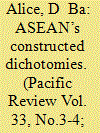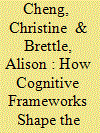| Srl | Item |
| 1 |
ID:
172127


|
|
|
|
|
| Summary/Abstract |
How best to assess ASEAN as a collective enterprise are longstanding. Producing often polar assessments of the organization and its activities, the question has been a recurrent one in the scholarship on ASEAN and any retrospective on the organization. Stubbs’ (2019) article does not resolve the question, but it does offer ways to make sense of the debate. It also identifies ways forward with its identification of analytic criteria by which ASEAN’s performance as an international organization has been assessed. How well his two-camp categorization of the literature captures the state of play, however, can be debated. It is also not without potential costs.
|
|
|
|
|
|
|
|
|
|
|
|
|
|
|
|
| 2 |
ID:
167665


|
|
|
|
|
| Summary/Abstract |
Why do American perspectives of international relations (IR) continue to hold sway over an increasingly diverse discipline? What actually constitutes “Americanness” in IR? Who is considered “American” in IR? These are the central questions we explore in this essay. Drawing on cognitive and behavioral insights from social psychology, we argue that there is a distinct “American approach” to international relations and security studies and that this approach is a product of Western cognitive frames. We identify three factors that represent the American approach's hyper-Westernized framing: individualism, equality, and a preference for causal rather than contextual analysis, and a preference for egalitarianism. We argue that these are reinforced by two social identity processes—academic identity and national identity. The consequences of “being American” in IR and security studies suggest not only problems of attention and accuracy, but an inherent failure to appreciate that Western—and particularly, American—ways of seeing and valuing the world are not universal.
|
|
|
|
|
|
|
|
|
|
|
|
|
|
|
|